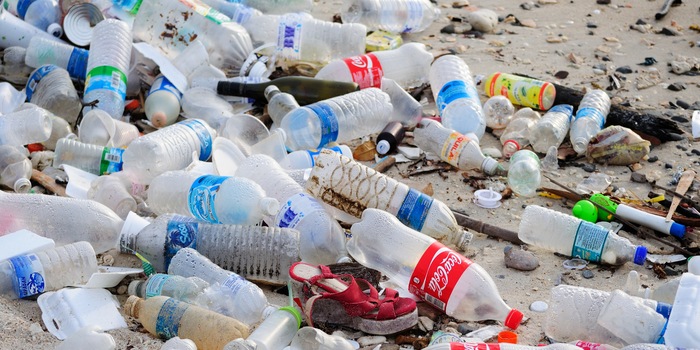
Infinitely reusable plastic
A new plastic should be able to be recycled an infinite number of times without any loss of quality. There is a simple principle behind this - but it is difficult to realise.
A new class of plastic is set to solve one of the biggest problems in plastic recycling. The material, known as PBTL, is suitable as an engineering plastic and can be recycled indefinitely, reports a research group led by Eugene Chen from Colorado State University. As the team writes in "Science Advances", the technology is based on customised sulphur-containing molecules, the bicyclic thiolactones. Not only can they be combined to form the long molecular chains of plastic, they can also be easily separated from the chains as individual molecules. This means that, unlike today's plastics, the material can be reprocessed without any loss of quality.
Currently used plastics such as polyethylene cannot be recycled without loss of quality because the original building blocks can no longer be separated from each other. However, the molecular chains inevitably become shorter and shorter during the recycling process. As a result, the properties of the plastic deteriorate, for example it becomes softer and less stable, so that it can only be used for less demanding purposes. This is known as "downcycling"; the material is not used in a cycle, but in a kind of downward spiral that inevitably ends in incineration or landfill.
No loss of quality
PBTL escapes this spiral because it is not the finished plastic, i.e. the chains, that is recycled, but the individual components. As with other plastics, the bicyclic thiolactones string together to form rings or chains and form a material with new, desirable properties. In contrast to conventional plastics, however, the reaction can be easily reversed by heating the material with a suitable auxiliary molecule, a catalyst. This decomposes PBTL back into the original bicyclic thiolactones. These can then be processed into new plastic without any loss of quality.
The principle of recyclable plastics is not new. However, no such material has yet met the conflicting requirements for recycled plastic. On the one hand, it must be possible to decompose it again without excessive effort, but on the other hand it must also be stable and elastic enough for technical applications. In addition, it must be possible to precisely control the exact structure of the chains and thus the properties of the material. This is possible in principle with the new material, writes Chen's team. However, PBTL does not overcome one problem: it can only be reused if it is available as a pure substance. However, a large proportion of the plastic is processed into composites of different materials.
Spectrum of science
We are partners of Spektrum der Wissenschaft and would like to make well-founded information more accessible to you. Follow Spektrum der Wissenschaft if you like the articles.
[[small:]]
Experts from science and research report on the latest findings in their fields – competent, authentic and comprehensible.
From the latest iPhone to the return of 80s fashion. The editorial team will help you make sense of it all.
Show all